Iraq. Archways to Peace
In February 2019 we opened our new Youth Center in Mosul, thanks to the contribution of our supporters who chose to donate and take part in our Christmas Campaign ‘Postconflict always needs Allies’ in order to promote peace. Even in Iraq. In 2011 we started working near Mosul on education programmes and the protection of minorities. As soon as the Daesh-occupied areas were liberated in February 2017, we went back in to find out what had happened to our beneficiaries during the war. Mosul, which was occupied for 3 years, is today a prime example of how war generates civil strife, marginalisation and hatred within a community, together with the suspicion that the people who stayed in the city were affiliated with Daesh. That’s why we are working on projects to promote social cohesion, by supporting all the young men and women who are determined to reclaim their futures.
Fahd, Abdullah, Younis, Ahmed, Rafal and Ahed are the centre’s first employees, having been trained in social conflict prevention. One of their first undertakings was to encourage dialogue between young Arab Sunni men and women and the young Shebak men and women, between whom there is a long-standing conflict. As described by our peace building officer Martina Pignatti, in the following article, we are their best allies. And we will be with them all the way.
***
In the old city of Mosul, when a young man wanted to get married, his father would ask the neighbours on the other side of the street if they could ‘lend him a shoulder’. An archway was then built between the two houses, known as a ‘qantara’ – the foundation for new rooms for children and grandchildren.
That is why in March 2018, 2 young activists from Mosul, decided to give the name Qantara to the city’s first cultural ‘coffee house’, inspired by Baghdad coffee houses, as a place to organise events, art exhibitions, debates and markets for the sale of items made by local artists.
This is a place for the cultural and political rebirth of the youth, as they wait for the institutions and the international community to start rebuilding the archways and houses of West Mosul, which was raised to the ground.
So we decided this was the right place to open our ‘Youth Space for Peace’ one of the Youth Centres which are part of our peacebuilding programme financed by the German Ministry for Cooperation through GIZ with support from our Christmas 2018 Campaign. We cover rent and expenses and we are reorganising the space and promoting new initiatives.
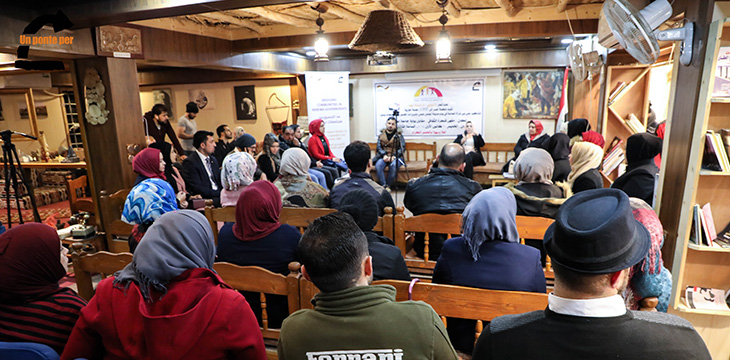
The early days of our Youth Centre.
As we walk up the steep steps one morning, passing portraits of Iraqi artists, intellectuals and political activists, we come to a cosy room decorated with traditional carpets and paintings. In the corner a journalist who is known for writing about human rights, is busy writing with a computer and a coffee, while a group of young men are planning their next poetry reading on the sofas.
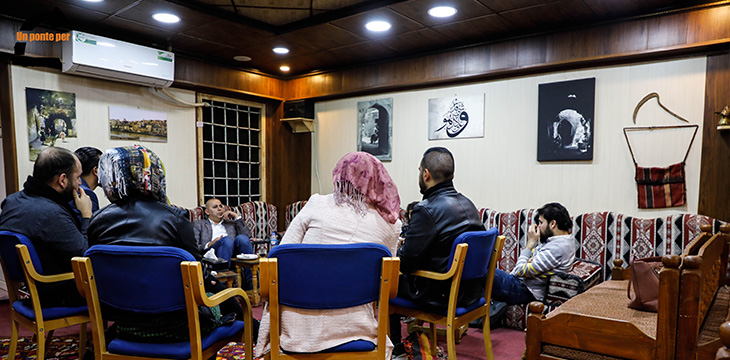
Meetings and activity at the Centre.
But together with new ideas we must also honour the memory of the suffering seen by this city, so there is ‘A Daesh Memorial’ – a wall covered with photos of the occupation, a copy of the magazine which was widely distributed by the fundamentalists and even the yellow overalls worn by those condemned to death.
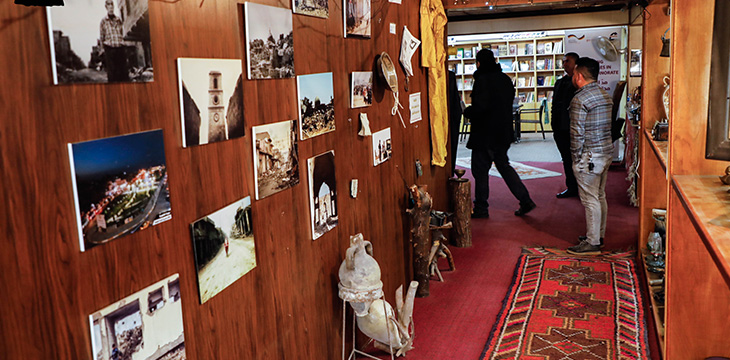
The ‘Daesh Memorial’ Wall.
Between the Centre’s library, which will be stocked with books on peace building and human rights, and a notice board selling jewellery and bags made by local craftspeople, there is the door to an office where a team of 7 men and women from Un Ponte Per are working.
This is our ‘Conflict Prevention Team’, made up of men and women trained in non-violent conflict resolution.
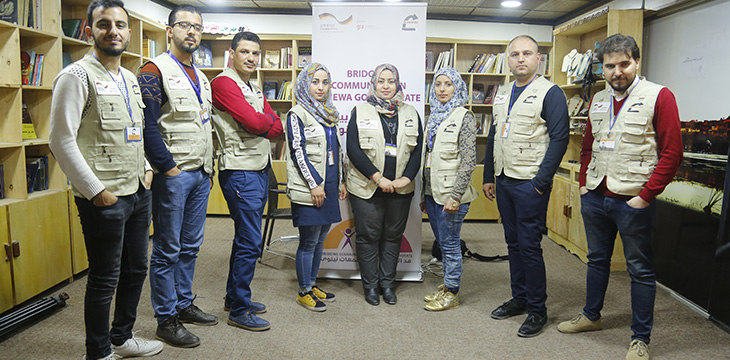
Our Conflict Prevention Team (CPT) in Mosul.
Work began in February, with a focus on promoting dialogue between young Arab Sunnis from Mosul and young people from the Shebak minority group from the surrounding villages, in order to agree on how to bring their respective communities together.
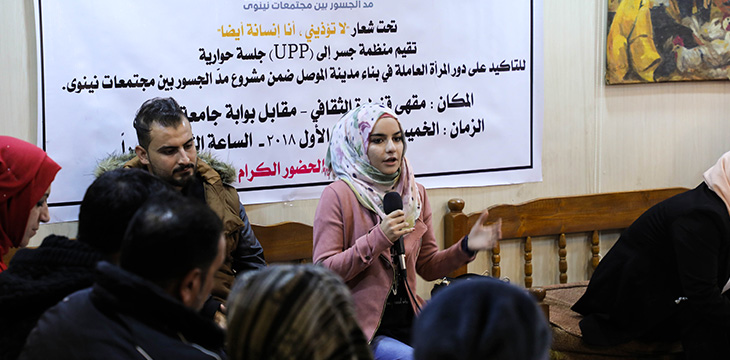
Work begins at the centre.
Leila, who is the coordinator, has a master’s degree in architecture and cultural heritage and is passionate about the ancient history which unites Iraqi communities and cultures.
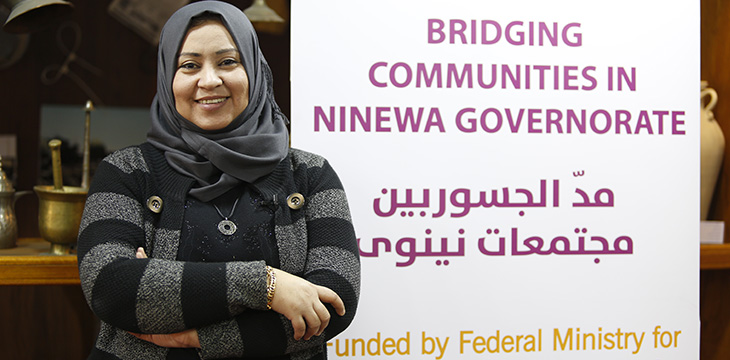
Fahad and Abdullah use social media to fight against inter-ethnic prejudice and discrimination, to encourage displaced people to come back, and to tell the world that the young people of Mosul are not all affiliated with Daesh…….This would seem to be stating the obvious but in fact this very notion of the Iraqi and American armies was the cause of the destruction of the city, with around 10,000 innocent victims.
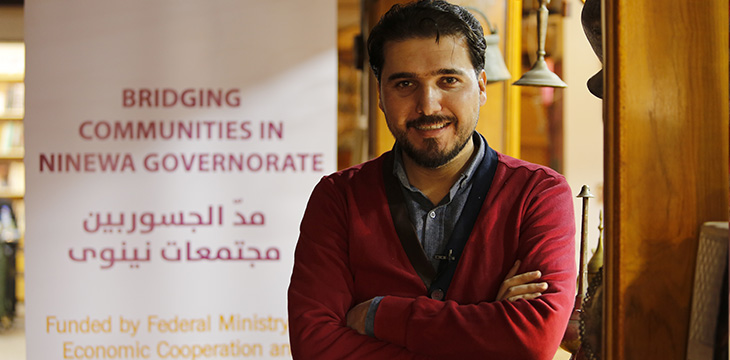
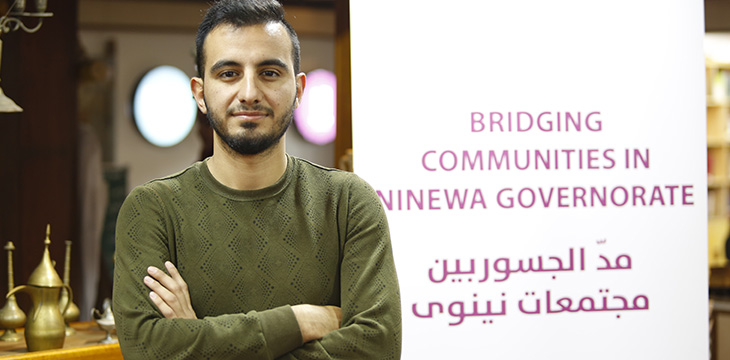
Younis is the founder of this cultural coffee house, but works in a tent surrounded by the rubble of the old city, listening to the complaints of the local population.
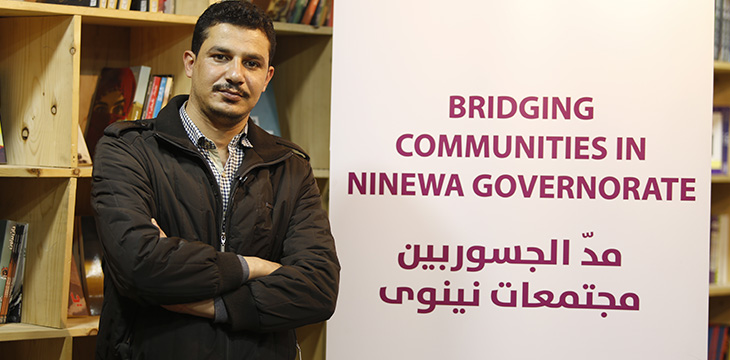
Ahmed is a psychologist studying how to prevent threats against local workers.
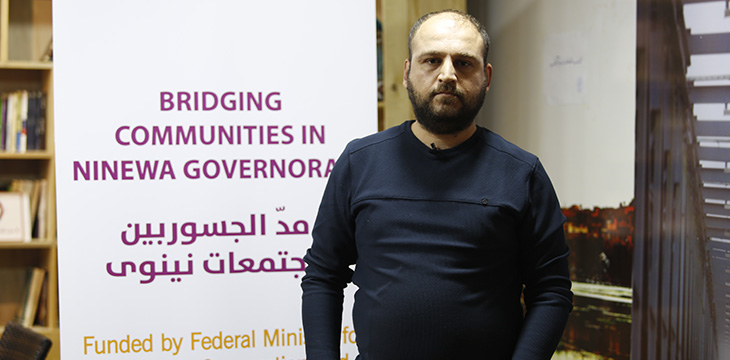
Rafael is a trainer, specialised in ‘alternatives to violence’.
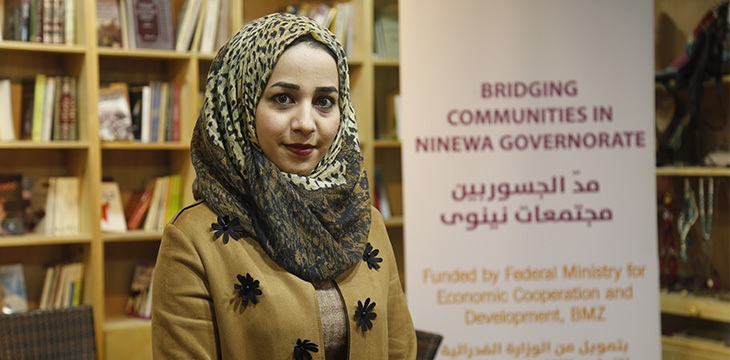
Ahed is an expert in the prevention of gender-based violence and also coaches a football team. Yes! A 5-a-side women’s football team in Mosul.
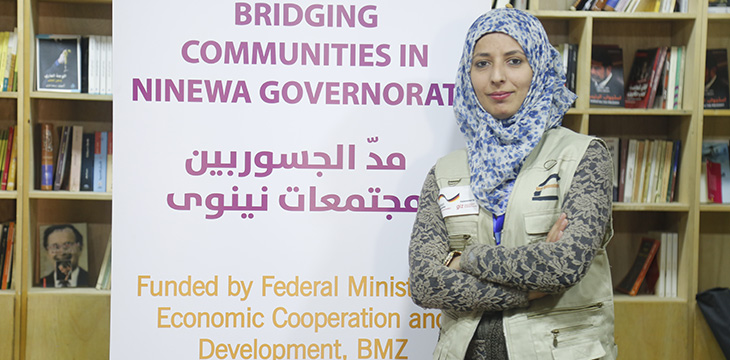
Ahmed teaches education science and works for a public institution to support mosques in the south-east of the city.
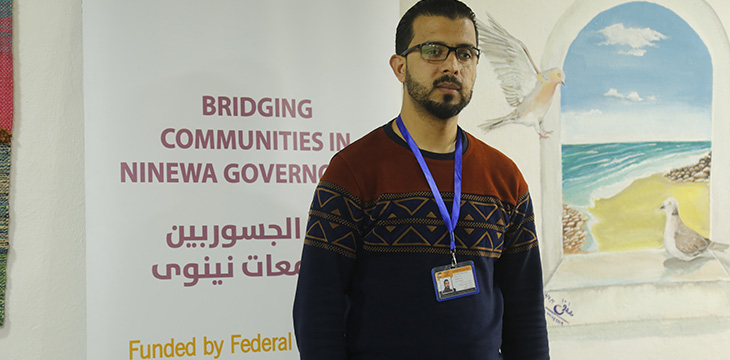
They all work part-time as peaceworkers in our Youth Centre. Some of them stayed in the city during the Daesh occupation – either because they could not get out or because they wanted to stay and help the inhabitants. During that time, one of them lost their baby daughter, one hid in a cellar for months, one survived Daesh prison, one lost half his face in an explosion.
Yet they are smiling and have a contagious energy, and they are bursting with ideas for new activities.
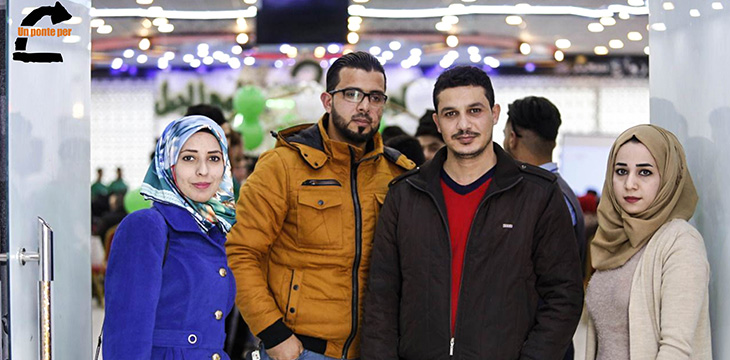
Part of the Mosul Conflict Prevention Team.
In the Ninive Plain, now liberated of Daesh, we have opened three more Youth Centres like the one in Mosul. Each has its own Conflict Prevention Team, for a total of 19 young people meeting together regularly to discuss the best ways to promote social cohesion. This will all come together at a Peace Forum in Mosul in June, which will be a chance to bring together local authorities, community leaders, activists, journalists and of course all the young men and women of our Youth Centres, all with one ambitious but vital objective: to explore peaceful ways to go beyond the fear which is preventing good relationships between the various communities living in Iraq today.
Today we start following their progress, with a feeling that this particular archway could be the foundation of new life for Mosul.
Martina Pignatti Morano, UPP Peacebuilding Officer.
